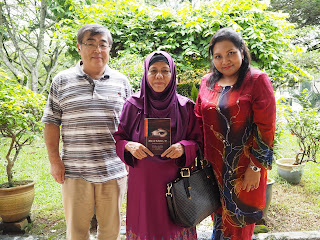I have
written poems about women in the legends, but
I am also concerned about the
present situation. What happened to the legendry ladies is happening to many
women in our time, though in different ways. Even today, marriages are not necessarily a matter of the heart. There are
marriages of convenience, marriages for family honour, business arrangements,
social commitments, and more often to save a woman and her family from the
social stigma. A girl is brought up to
preserve a good name so that she will be married into a good family. It is believed that no woman
would remain unmarried by choice . There is a high and often unaffordable price
of living alone and remaining true to one’s identity and carving one’s own
destiny. My point is what I put in the line, “A woman has to be less herself,
in order to be more a woman”. This is delivered in a poem entitled “Marriage”:
Marriage
-one woman’s opinion
Marriage is the difficulty
Of changing routines and priorities
That make you less yourself
And a woman has to be less her self
In order to be more a woman.
Marriage to a woman
Is a protection
For her who dares not live
On her own identity
It is too costly and too risky.
Even
up to the present time some young girls sacrifice advancement in career for a
marriage prospect much to the loss of their nations. In a poem “Salam Perempuan
Dari Penjara,” (A Woman’s Greeting From Prison, 2010) [S1] ,
I looked at a woman’s journey through
life as a procession which no one dares to divert from. It is a procession
where everyone walked to a fixed destiny:
A
woman’s greeting from prison
One Zurinah in a chamber with her sisters
She dares not go out again
Though the field is calling her name
For here they let her have
Anything except her own self
She has something to say
But she does not own a voice
A woman must be protected
Her words could harm herself
So she offers unrefined verses form her
prison
In a hurry to live up to their expectation
They demand perfection
Before the evening wind
Drop petals of roses on her table
Before the last shadow
Pass by her window
Before the twilight rays
Throw
lines on the glaze
And lines on her face
She and her sisters
In a procession to their dying day
While within these walls
They had never lived at all.
Original version in Bahasa Melayu
Salam
Perempuan dari Penjara
Seorang Zurinah
di kamar saudara-saudara perempuannya
Dia tidak berani keluar lagi
Ke padang
Di sini ia bisa memiliki apa saja
Kecuali dirinya sendiri
Dia mahu berkata
Tetapi tidak punya suara
Kerana bahasa seorang wanita
Telah menjadi merbahaya
Lalu ditawarkan puisi-puisi sumbang dari
kurungan
Terlalu banyak yang minta disempurnakan
Sebelum angin petang turun
Meleraikan mawar di meja
Sebelum bayang-bayang terakhir
Berlalu dari jendela
Sebelum senja menyuramkan
Garis-garis di kaca
Garis-garis di muka
Dia dan saudara-saudara perempuannya
Dalam perarakan menuju harimati
Sedang ketakutan telah lama
Membunuh mereka..
( Di
sini tiada perhentian: 4)
The translated version together with the original are later published in Menghadap
ke Pelabuhan/Facing the Harbour: ITBM Kuala Lumpur, 2010. The second printing is in 2013 and third printing in 2018.The collection was also translated into Spanish, Russian, Japanese and French.
As I
have mentioned earlier, there are women who marry for the sake of freeing
themselves from social stigma. As for choosing their life partners, the elders
told their girls not to be choosy and told their boys to choose their bride
properly. This depressing situation gave rise to a poem “Satu Percakapan Singkat”
(A Short Conversation):
A Shprt Conversation
(with a fellow poet)
My friend
On our love for this
life
We may not differ from
each other
On our love for poetry
That too is similar
But you are a man
And I am a woman
That make the whole
different
A man is free
to limit his choice
a woman limits her
choice
to free herself.
.
((Menghadap
ke Pelabuhan/Facing the Harbour: pp.88-89)
Born
as a woman, there is not much that you can do but pray to God for his
protection and guidance. I wrote a poem,
“Nyanyian Menidurkan Halini” (A Lullaby to Halini), in which I told a
little girl not to cry. And I wish I
could teach her not to shed tears now
and forever. She should grow up as a strong personality and not to cry on the
wrong shoulders.
With this song Halini
I put you to sleep
Sleep will not always come easy
When you are old enough to know it
Calm down Halini
Don’t cry anymore
You must learn to value your tears
Don’t let it fall
on any wrong shoulders.
May you grow up Halini
With courage and confidence
Put your trust in God
You will really need him
Because you are born a woman.
((Menghadap ke Pelabuhan/Facing the Harbour: pp.80-81)





















